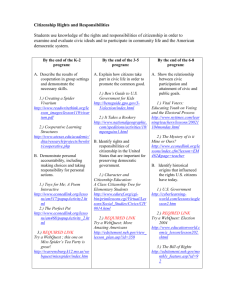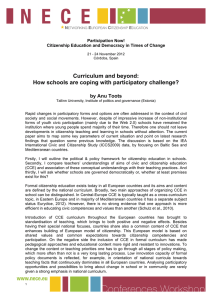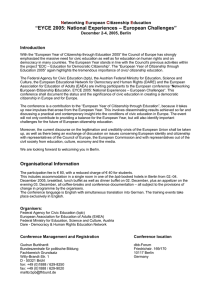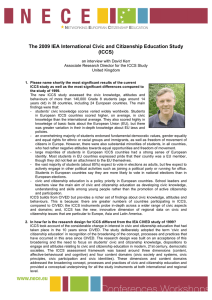Document 11540194
advertisement
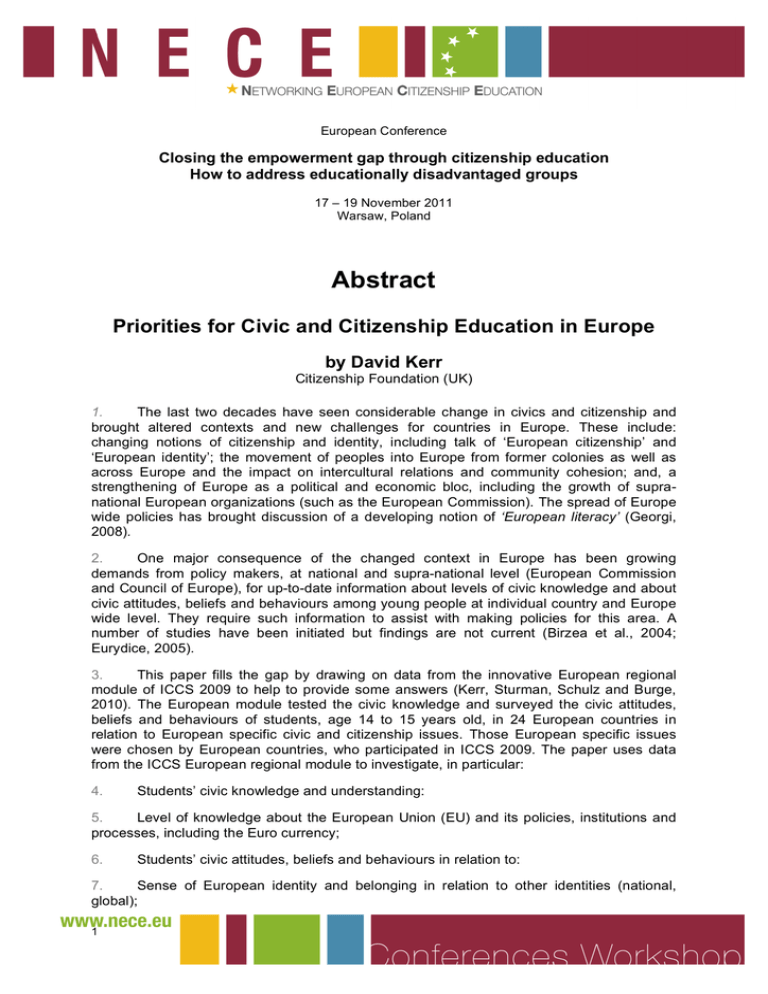
European Conference Closing the empowerment gap through citizenship education How to address educationally disadvantaged groups 17 – 19 November 2011 Warsaw, Poland Abstract Priorities for Civic and Citizenship Education in Europe by David Kerr Citizenship Foundation (UK) 1. The last two decades have seen considerable change in civics and citizenship and brought altered contexts and new challenges for countries in Europe. These include: changing notions of citizenship and identity, including talk of ‘European citizenship’ and ‘European identity’; the movement of peoples into Europe from former colonies as well as across Europe and the impact on intercultural relations and community cohesion; and, a strengthening of Europe as a political and economic bloc, including the growth of supranational European organizations (such as the European Commission). The spread of Europe wide policies has brought discussion of a developing notion of ‘European literacy’ (Georgi, 2008). 2. One major consequence of the changed context in Europe has been growing demands from policy makers, at national and supra-national level (European Commission and Council of Europe), for up-to-date information about levels of civic knowledge and about civic attitudes, beliefs and behaviours among young people at individual country and Europe wide level. They require such information to assist with making policies for this area. A number of studies have been initiated but findings are not current (Birzea et al., 2004; Eurydice, 2005). 3. This paper fills the gap by drawing on data from the innovative European regional module of ICCS 2009 to help to provide some answers (Kerr, Sturman, Schulz and Burge, 2010). The European module tested the civic knowledge and surveyed the civic attitudes, beliefs and behaviours of students, age 14 to 15 years old, in 24 European countries in relation to European specific civic and citizenship issues. Those European specific issues were chosen by European countries, who participated in ICCS 2009. The paper uses data from the ICCS European regional module to investigate, in particular: 4. Students’ civic knowledge and understanding: 5. Level of knowledge about the European Union (EU) and its policies, institutions and processes, including the Euro currency; 6. Students’ civic attitudes, beliefs and behaviours in relation to: 7. Sense of European identity and belonging in relation to other identities (national, global); 1 8. European policies and institutions, including levels of trust and expected future participation in European elections; 9. Equal rights in Europe including for ethnic and racial groups and for immigrants; 10. European language learning; 11. European policies concerning political and currency harmonization and the movement of peoples across countries. 12. The paper presents the most up-to-date snapshot concerning the civic knowledge and attitudes of the next generation of European citizens within and across countries. It concludes with a discussion of the implications of the key findings for policy-makers, practitioners and researchers, both in and beyond Europe. REFERENCES Birzea, C., Kerr, D., Mikkelsen, R., Pol, M., Froumin, I., Losito, B., & Sardoc, M. (2004). All European study on education for democratic citizenship policies. Strasbourg, France: Council of Europe. Eurydice. (2005). Citizenship education at school in Europe. Brussels, Belgium: Eurydice. Georgi, V. (Ed.) (2008). The Making of Citizens in Europe: New perspectives on citizenship education. Bonn: Bundeszentrale für politische Bildung. Kerr, D, Sturman, L., Schulz, W. and Burge, B. (2010). ICCS 2009 European Report - Civic knowledge, attitudes and engagement among lower-secondary students in 24 European countries. Amsterdam: International Association for the Evaluation of Educational Achievement (IEA). Available at: http://iccs.acer.edu.au/uploads/File/Reports/ICCS_EuropeanReport.pdf 2




